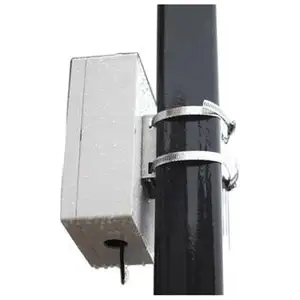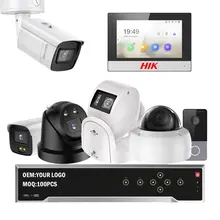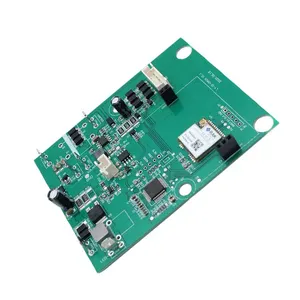What are Dvr Cards
DVR cards, an abbreviation for Digital Video Recorder cards, are an essential component in surveillance systems. These cards are designed to be installed into a computer or a specialized recording device, enabling it to capture and store video feeds from security cameras. DVR cards are primarily used by businesses, security firms, and individuals who need to monitor and record video for security purposes, such as in retail stores, offices, banks, or even residential properties.
At their core, DVR cards work by converting the analog signal from CCTV cameras into digital format. This digital conversion allows the video to be compressed and stored more efficiently on hard drives. The card is fitted with one or more video input ports to which the cameras are connected. Once installed and configured, the DVR card works in tandem with software that enables users to view live feeds, record videos based on specific criteria such as motion detection, and play back recorded footage. Some DVR cards also incorporate additional features like audio inputs, network capabilities for remote viewing, and high-definition support.
The importance of DVR cards lies in their ability to provide continuous surveillance without the need for direct oversight. The footage captured can be invaluable for investigating incidents, providing evidence in legal scenarios, or simply maintaining a record of activities within a monitored area. With advancements in technology, these cards have become more sophisticated over time, offering higher resolutions, better storage capacities, and intelligent features that enhance surveillance capabilities.
Types of Dvr Cards
The market offers a variety of DVR cards tailored to different surveillance needs. Here’s a brief overview:
Basic DVR Cards: These are entry-level cards that offer fundamental recording functions. They generally support a fixed number of camera inputs and standard-definition recording. Ideal for small setups where the surveillance demands are minimal.
Advanced DVR Cards: For more complex security systems, advanced DVR cards provide high-definition recording and can support a larger number of camera feeds. They often come with enhanced features such as motion detection recording and network connectivity for remote access.
Hybrid DVR Cards: These cater to systems that require flexibility in using both analog and IP-based cameras. Hybrid DVR cards allow users to integrate existing analog cameras while gradually shifting towards newer IP-based surveillance solutions.
Compression DVR Cards: With storage space being a prime concern for continuous recording, compression DVR cards use technology like H.264 to reduce file sizes without compromising video quality. This is essential for systems where long-term storage of footage is necessary.
Multi-Channel DVR Cards: Designed for extensive security systems that monitor multiple locations simultaneously, multi-channel DVR cards can support a high number of camera inputs and often come with robust software suites for comprehensive management.
Each type serves certain use cases better than others; hence understanding the requirement is crucial before making a selection.
How to choose Dvr Cards
Choosing the right DVR card for your business can greatly influence the effectiveness of your surveillance system. Here are some key considerations:
Number of Cameras: Assess the number of cameras your system will need to support both now and in the future. Opt for a DVR card with enough channels to accommodate potential expansion.
Video Quality Requirements: Determine the resolution at which you need your video feeds recorded. Higher resolutions offer more detail but require more storage space.
Storage Capacity: Look for DVR cards that utilize efficient compression technologies if you need long-term storage or have many cameras feeding high-resolution video.
Software Compatibility: Ensure that the card is compatible with the software you plan to use for managing your surveillance system. The software should be user-friendly and provide all necessary features like live viewing, playback, and archiving.
Remote Access and Monitoring: If remote monitoring is important for your operations, choose a card that supports network connectivity and offers secure access to video feeds from different devices.
Considering these factors will help you select a suitable DVR card that aligns with your business's surveillance objectives.
Best Dvr Cards on Alibaba.com
Alibaba.com stands as an international marketplace connecting businesses with a vast selection of DVR cards suitable for various surveillance needs. Whether you're looking to upgrade an existing system or implement a new one from scratch, Alibaba.com offers an extensive range covering basic to advanced requirements without compromising on quality or functionality.
The platform provides an efficient sourcing experience with detailed product descriptions and supplier profiles that assist in making informed decisions. Moreover, Alibaba.com's Trade Assurance service adds an extra layer of protection for transactions, ensuring that payments are secure until delivery is confirmed.
With over two decades of experience facilitating global trade solutions, Alibaba.com has established itself as a reliable destination for businesses seeking not only functional technology like DVR cards but also comprehensive trade services that simplify the procurement process across borders. The ease of use coupled with customer-centered features makes Alibaba.com an ideal marketplace for finding suitable surveillance components tailored to your business needs.
Common FAQs for DVR Cards
What is a DVR card and how does it work?
A DVR card is a type of electronic circuit board that is installed into a computer or recording device, allowing it to receive video feeds from surveillance cameras, convert them into digital format, and store them on a hard drive.
How many types of DVR cards are there?
There are several types of DVR cards, including basic, advanced, hybrid, compression, and multi-channel DVR cards. Each type is designed to meet specific surveillance and recording needs.
What should I consider when choosing a DVR card for my surveillance system?
When selecting a DVR card, consider the number of camera channels needed, video quality requirements, storage capacity for recorded footage, software compatibility, and whether remote access and monitoring are necessary.
Can DVR cards support both analog and IP cameras?
Hybrid DVR cards are specifically designed to support both analog and IP cameras, allowing for flexibility in surveillance system setups.
How do I know if a DVR card is compatible with my surveillance software?
Check the specifications provided by the manufacturer or supplier of the DVR card to ensure that it is compatible with your chosen surveillance software.
What is video compression in DVR cards and why is it important?
Video compression in DVR cards refers to the technology used to reduce the file size of recorded video without significantly affecting quality. This is important for saving storage space and managing large volumes of footage efficiently.
Can I access my surveillance system remotely with a DVR card?
Many advanced and hybrid DVR cards offer network connectivity features that enable remote access and monitoring of your surveillance system from different devices.
Are there any storage limitations with DVR cards?
Storage limitations will depend on the specific capabilities of the DVR card you choose and the amount of data generated by your surveillance cameras. Cards with efficient compression technologies can help mitigate storage constraints.
How do I ensure I’m choosing a high-quality DVR card?
Look for reputable suppliers who provide detailed product specifications and have positive ratings. Additionally, consider the technology used in the card and its compatibility with industry standards.
Is it possible to expand my surveillance system with additional cameras in the future?
Choose a DVR card that supports more channels than you currently need to allow for future expansion of your surveillance system without needing to replace the card.



































 浙公网安备 33010002000092号
浙公网安备 33010002000092号 浙B2-20120091-4
浙B2-20120091-4